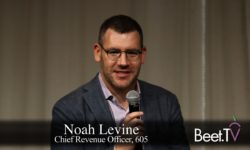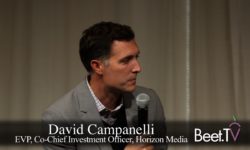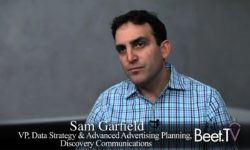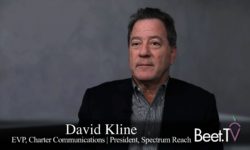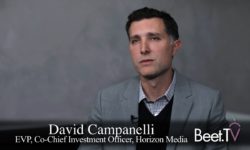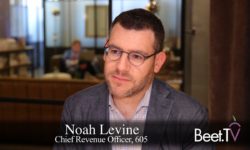They are two of the key developments being touted to revolutionize TV ad buying – but are “deterministic” targeting and outcome attribution really up to scratch?
During “Data Activation, the New Tool for Programmers”, a panel convened at Beet Retreat In The City, executives held a refreshingly frank discussion on the true state of two of the most talked-about tech…
- WarnerMedia – Dan Aversano, SVP, Ad Innovation & Programmatic
- Discovery Communications – Sam Garfield, VP, Data Strategy and Advanced Audience Platforms
- 605 – Noah Levine, chief revenue officer
They were questioned by Howard Shimmel of Janus Strategy & Insights.
What’s driving ‘deterministic’?
This year, executives like Levine have started describing the ability of advertisers to truly know who they are targeting with connected TV as “deterministic TV“, a proposed label that is in its infancy.
For Discovery’s Garfield: “I think about it as known versus inferred (audience profiles). As a national programmer at Discovery for 30 years, what we really knew about our audience was on an anonymized basis … age, gender…. inferred from a panel.
“Today, through our affiliate agreements, we actually have access to known (ad) exposures on set-top boxes where they know that person, they know what they’ve watched.”
Determinism is imperfect
WarnerMedia’s Aversano cautioned against expecting that the capabilities enabled by “deterministic” will grow to account for all TV targeting tactics.
“As an industry there’s been a ton of lip service given to this idea of a pure deterministic world,” he said. “It just will never happen. You’re never going to have perfect census-level measurement of everything. I don’t think you will. We need to accept the fact it will never be perfect – (instead), just make it a little bit better.”
Levine, deterministic’s champion, agreed. “Deterministic data today, unless you have a hundred percent of the U.S population, it’s not going to work, which is why you have to apply the projection methodologies,” he said. “But deterministic data activation allows us to do things on television that historically have been very hard to do.”
Attribution is expensive
Which brought the panel to the second much-lauded technology – the new ability to attributed advertisers’ intended brand outcomes (be it a purchase or a click) directly back to a viewer’s exposure to a TV ad.
New services allow a line to be drawn between those things. But WarnerMedia’s Aversano says the cost of real attribution is prohibitive.
He explained: “The attribution marketplace today… you have a handful of vendors who I think have really good solutions, but they are cobbled together from lots of different third-party datasets that they have to pay for in licence that they in turn then charge advertisers, agencies and media companies for. A typical attribution study that we run for a specific campaign costs $30,000 to $120,000 for one campaign.
“That’s a million-dollar campaign and we have to spend a hundred thousand dollars to measure it. That will never scale.”
Attribution is uncertain
Aversano said the reality of this kind of attribution measurement is, it isn’t effective enough.
“The state of the industry today and this ecosystem of vendors is … none of it is at scale and none of it is always-on, (it) almost makes that impossible,” he said.
Discovery’s Garfield urged publishers not to dive farther in to offering guaranteed outcomes against ad purchases.
“We just don’t have enough of that understanding or benchmarks around what’s driving these numbers to really start guaranteeing on that,” he said. “And I think we all have to take a step back and understand one step deeper around what’s driving some of these outcomes.
“If the same audience is seeing the same creative across a bunch of networks, then what really is the differentiator in that outcome? And that’s what we’re trying to understand and we’re working with vendors and talking obviously to agencies about helping us together to understand that.”
Beet Retreat In The City @ Horizon Media is presented by 605 and Spectrum Reach. For more videos from the event, please visit this page.











